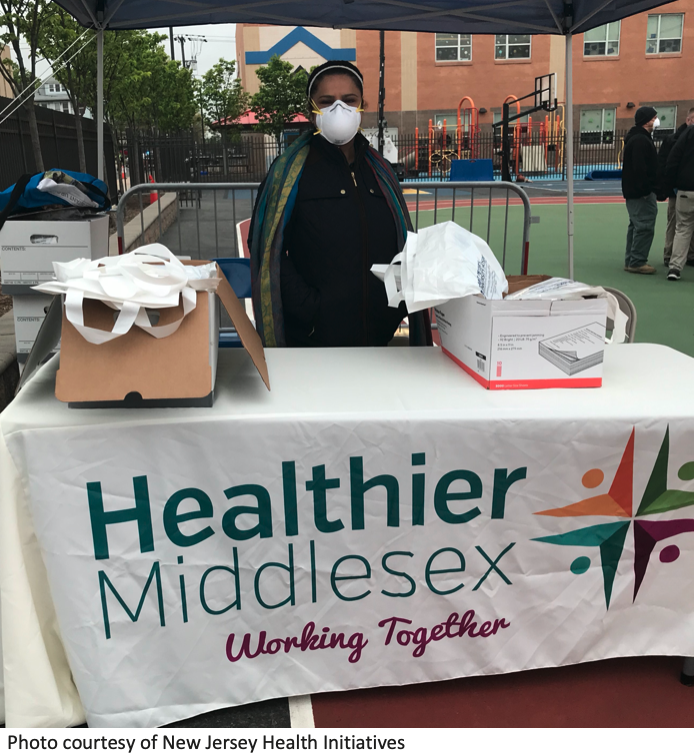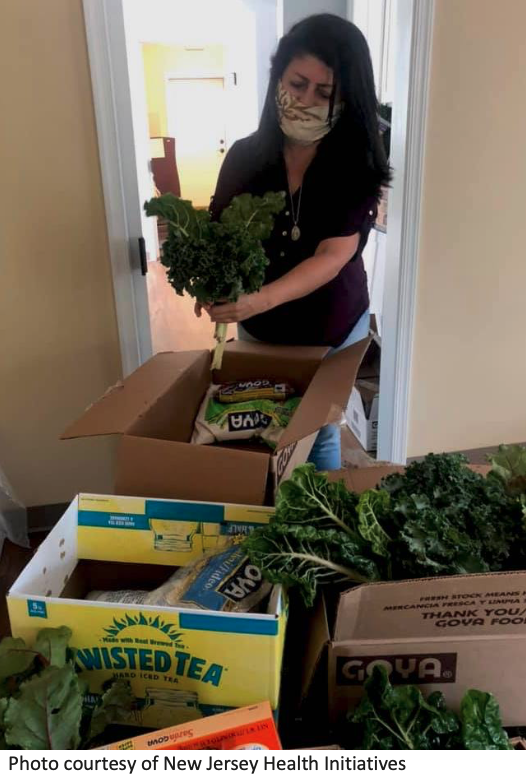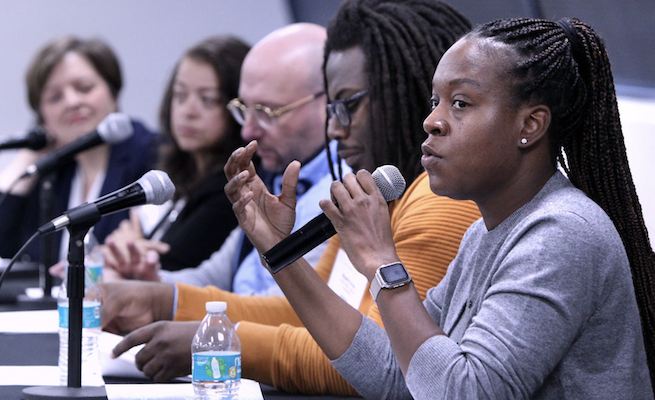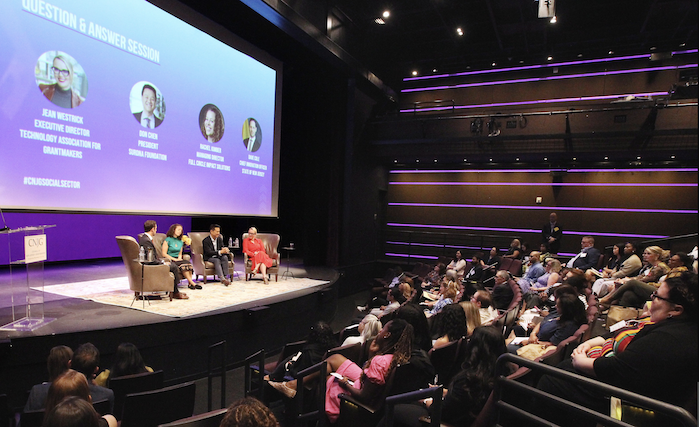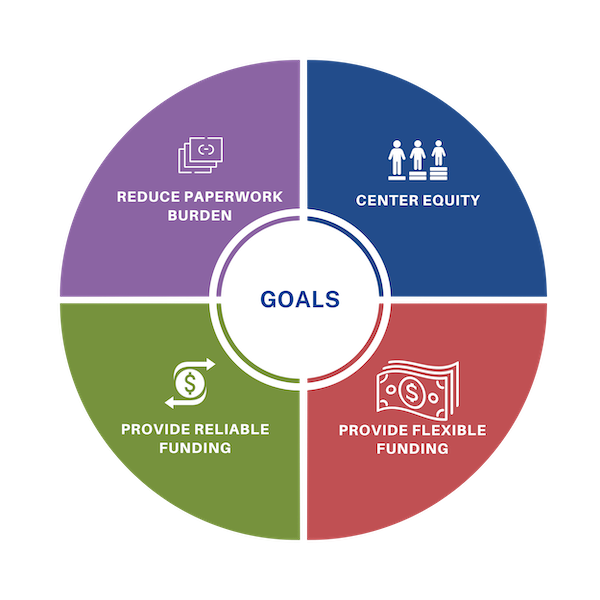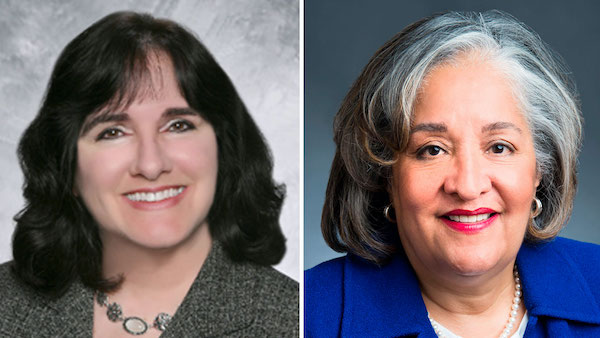Site Search
- resource provided by the Forum Network Knowledgebase.
Search Tip: Search with " " to find exact matches.
Small BIPOC organizations and/or historically excluded/led
organizations have greater access to funding.
Affirmation: We must center the most marginalized, underfunded, and impactful organizations.
BIPOC, grassroots, and/or historically excluded1 leaders are the most proximate to the populations and communities that face the most pressing social issues and should be central to designing solutions and funded; yet they are often overlooked or ignored as real change-makers.
They are underinvested in by major funders and are often left to struggle on their own; and when they are funded, grants are small and often highly restricted.
Some funders have artificially high budget requirements, require collaboration with larger “more sophisticated” organizations, won’t fund fiscally sponsored groups, or emphasize leadership requirements that are increasingly out of date or exclude vital lived experience.
Community organizations are exploring innovative and egalitarian management structures, such as co-directorships, collectives, and collaboratives, that do not resemble the constructs of the past.
Leadership comes in all structures, sizes, and identities; funders must seek to recognize and fund those who are doing effective work and re-evaluate their views of accepted leadership patterns. For BIPOC, grassroots, and/or historically excluded leaders to succeed, we must provide flexible resources and professional development support while they are leading.
Activities
Below are activities your organization can engage in that will advance your equity focus
• Agree as a community of practice to a shared definition of BIPOC, grassroots, and/or historically excluded-led organizations to foster a common frame of reference to help guide this work.
• Create networking and referral opportunities for BIPOC, grassroots, and/or historically excluded leaders to expand their access to funding and opportunities similar to that of larger, mainstream groups.
• Invest in the development and pipeline of BIPOC, grassroots, and/or historically excluded leaders.
• Remove funding barriers for small BIPOC, grassroots, and/or historically excluded organizations that have traditionally been precluded from funding because of budget size, leadership structure, auditing requirements, and similar obstacles.
• Actively partner with BIPOC, grassroots, and historically excluded organizations to make funding decisions on issues closest to their communities.
• Provide significant, multi-year, general operating funding to organizations and movements led by BIPOC, grassroots, and/or historically excluded communities.
Short-term Outcomes
• Progress is tracked into addressing the barriers to funding BIPOC, grassroots, and historically excluded-led organizations in NJ.
• A greater number of BIPOC, grassroots, and/or historically excluded-led organizations are funded than before, by new and existing funders.
• Professional development and capacity building as requested by BIPOC, grassroots, and/or historically excluded leaders is funded.
Long-term Outcomes
• BIPOC, grassroots, and/or historically excluded leaders can access funding and opportunities similar to that of larger, mainstream groups.
• A greater percentage of support to organizations and movements led by BIPOC, grassroots, and historically excluded communities is provided as significant, multi-year, general operating funding. In this context, “significant” can refer to both the quantity, size or percentage of grants awarded by the funder in any given year.
How to Begin Doing Good Better on Equity
Learning opportunities
• Which criteria and practices are creating, perpetuating or exacerbating exclusion of BIPOC, grassroots, and or historically excluded-led organizations?
• For funders that exclude or limit funding to small organizations, why are these barriers in place? What biases or missed opportunities are resulting from these obstacles?
• When funders are actively prioritizing BIPOC, grassroots, and historically excluded -led organizations in their philanthropic partnerships, what definitions, outreach, and partnership strategies are being used? How has this evolved based on lessons learned?
Pre-Work
• Funders should become educated about how traditional ways of identifying grantees and other criteria often excludes BIPOC, grassroots, and/or historically excluded-led organizations.
• Actively seek and share ways to center, identify, fund, and partner with applicants or community-based partners to create solutions in all efforts.
• Identify forums or protocols for introductions, dialogue, and relationship-building between funding community and BIPOC, grassroots and/or historically excluded-led organizations to pave the way for ongoing or stronger partnerships.
General Operating Support or General Project Support
Affirmation: Funds with the least restrictions are the most valuable
Nonprofits maintain and strengthen their organizations when their funds are unrestricted. Data shows flexible and reliable funding increases impact when nonprofit leaders have control over how funds flow to meet the needs of their constituents and internal operations, as demonstrated during the pandemic when funders released previously restricted funding. General operating support (GOS) funding signals trust in our partners and can open more honest dialogue about meeting the mutual goals of the funder and nonprofit. Funders who make project or program grants should trust the organization and provide flexible funding within a specific program.
Activities
• Over the short term, funders aim to shift their GOS activity by 30%. (30% more grants shift from program to GOS, or from fully restricted to negotiated GOS.)
• Provide grants as unrestricted organizational general operating support. The long-term ideal is for most, if not all, grants to be 100% GOS, unless a funder is legally precluded from doing otherwise.
• For project/program grants, 100% of the grant awarded is unrestricted (negotiated GOS), applying mission-based and mutually negotiated outcomes.
• Nonprofits articulate their organizational vision, strategies and intended outcomes to funders; funders understand the models of their grantee partners and learn from them how the grantee partner's work will lead to change.
• Trust nonprofit partners to know how to best apply their funding.
• Create a shared understanding of the meaning and importance of full-cost budgeting and real-cost funding.
Short-term Outcomes
• 70% of funders are shifting some of their distribution to making general operating support grants.
• 100% of program/project grants are designated unrestricted.
Long-term Outcomes
• 100% of all grants are made without restrictions, unless limited by covenant or donor wishes in the case of community foundations.
• All nonprofits can clearly articulate their vision, strategies, outcomes, and business models to funders; and funders understand them and trust them to know how best to use their funds.
How to Begin Doing Good Better on Flexibility Learning Opportunities
• Why aren’t some funders planning to award GOS or negotiate GOS?
• Ask funders: If you participated in CNJG’s 2022 funder survey and indicated that you planned to initiate GOS, have you done so? • Why are some grants restricted?
• What would it take for funders to change?
Pre-Work
• Seek and share learning opportunities for funders, prioritizing education of foundation boards, to address the barriers to awarding GOS and understand how restricted funding undermines financial sustainability.
• For funders who already regularly provide GOS funding, educate/advocate for others to do the same.
• Learn how GOS/negotiated GOS strengthens grantee partners and the multiple ways they can use and evaluate GOS. Actively seek insights from nonprofits to reinforce the message about GOS in their funding partnerships.
• As an incremental step for funders that are not receptive to GOS, provide education about negotiated general programming support (flexible funding within a mutually agreed-upon program area, as opposed to organization-wide GOS).
• Share promising practices on evaluation of GOS and negotiated GO
These news articles show our members’ responses to the coronavirus pandemic, including announcements, emails, blogs, grants and other resources. If you have items to add, please email us.
Actions and Announcements
Audible Creates Global Center for Urban Development and Hires Aisha Glover to Help Lead It
Russell Berrie Foundation Post: Our Response to COVID-19
Campbell Soup to pay hourly employees premium during outbreak
Post: Our Response to COVID-19
Geraldine R. Dodge Foundation
Dodge signs CoF pledge
Grunin Foundation 3/13 COVID-19 Announcement and 3/31 COVID-19 Update
Johnson & Johnson’s lead COVID-19 vaccine candidate shots for early 2021 authorization
Robert Wood Johnson Foundation
Culture of Health Blog: Handwashing to Slow the Coronavirus Pandemic
Opinion: Racism is the other virus sweeping America during this pandemic by Julie Morita, M.D
Opinion: Disabled Americans can’t be a COVID-19 afterthought by Dr. Richard Besser
Culture of Health Blog: Incarceration Rates: A Key Measure of Health in America
Opinion: In Covid-19 Crisis, Philanthropy’s Attention Must Focus on People With Disabilities
Brief: Health Equity Principles for State and Local Leaders in Responding, Reopening & Recovering from COVID-19
Culture of Health Blog: Lessons for an Equitable COVID-19 Response and Recovery
Kessler Foundation has produced two COVID related podcasts:
Practical Tips to Help Survive the Pandemic as a Parent of a Child with Autism
COVID-19 and Spinal Cord Injury: Minimizing Risks for Complications
New Jersey Council of Humanities Op-ed: Staying Human During the Pandemic
New Jersey Health Initiatives’ Deputy Director of Programs, and CNJG Board Member Diane Hagerman penned “Collaboration across county lines is key to a healthy New Jersey” on NJ Spotlight.
New Jersey Council for the Humanities and New Jersey Historical Commission present a webinar series for cultural nonprofits navigating the COVID-19 pandemic
New Jersey Economic Development Authority assists more than 10,000 small businesses impacted by COVID-19
New Jersey State Council on the Arts partners with ArtPride New Jersey Foundation on “Keep Jersey Arts Alive” campaign.
Newark Arts and the City of Newark Retools Its Ambitious Arts Grant Program to Respond to COVID-19
Nicholson Foundation Email to Grantees
Nicholson honors their own Colette Lamothe-Galette, lost to COVID-19
OceanFirst Foundation and Grunin Foundation along with Townsquare Media Launch Acts of Kindness Campaign
Subaru teams up with TerraCycle on PPE recycling
Turrell Fund Email to Grantees about CARES Act
Turrell Fund manages new Passaic County Pandemic Partnership hosted at the Community Foundation of New Jersey
United Way of Greater Mercer County Op-ed message from Sandra Toussaint
Valley National Bank offers Community Pledge CD to help donate and save at the same time
Resources
Newark Trust for Education COVID19 Resources
New Jersey State Council on the Arts Resources for Artists and Arts Organizations
Video: Hear from recognizable native New Jersey voices about the importance of donating to the New Jersey Pandemic Relief Fund
PKF O’Connor Davies: Grantmaking During Disasters & Tax-favored Financial Assistance to Employees
In 2003, with member support, CNJG commissioned a report on the impact a potential conversion of Horizon Blue Cross Blue Shield to a for-profit might have on access to health care in New Jersey. Research from the Center for State Health Policy (CSHP) at Rutgers University, provided details about the law governing such conversions in New Jersey and the experience of other states with conversions. The report identified questions raised in other states when such conversions occur, especially about the valuation of assets, the impact on low-income families, and the operation of the philanthropic foundations that have been established as stewards of the assets generated by the conversions. CNJG’s purpose was to seek answers to critical questions relevant to the availability of healthcare coverage for New Jersey’s citizens and to discuss models of best practice for healthcare conversion foundations across the United States.
Excellence in Giving
In 2005, CNJG adopted Guiding Beliefs & Principles to offer a thoughtful source of direction and inspiration to help guide our state’s philanthropic sector into the future. CNJG first launched its Excellence in Giving initiative in 2007 with the goal is to provide grantmakers the practical tools necessary to ensure best practice in their operations and grantmaking.
The first booklet, Guiding Beliefs & Principles for New Jersey Grantmakers includes a wealth of insights and tips related to board governance, legal compliance, grantee communications, fiscal responsibility, public disclosure, and many other key areas of foundation governance and operations. It contains wisdom provided by leaders of all types of giving organizations within the CNJG’s membership, and is intended to serve as a practical resource to assist New Jersey foundations in their grantmaking. CNJG’s board is in the process of updating these beliefs and principles in 2023/2024. For more information on the updating process, please contact Theresa Jacks.
 In 2010 CNJG released a second, comprehensive resource to help the state’s philanthropic community understand their ethical, legal, and fiduciary requirements and obligations - What Every Grantmaker Should Know and Frequently Asked Legal Questions. These two booklets are key publications in CNJG’s Excellence In Giving Series. While the Guiding Beliefs & Principles is available publically, members will need to log into access the legal guide for download.
In 2010 CNJG released a second, comprehensive resource to help the state’s philanthropic community understand their ethical, legal, and fiduciary requirements and obligations - What Every Grantmaker Should Know and Frequently Asked Legal Questions. These two booklets are key publications in CNJG’s Excellence In Giving Series. While the Guiding Beliefs & Principles is available publically, members will need to log into access the legal guide for download.
Members can request additional copies of the booklets mentioned on this page by contacting Theresa Jacks.
Inspiring Change through Leadership: Maximizing Philanthropic Impact
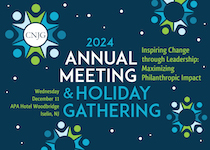 Wednesday, December 11, 2024 - 9:00am to 3:00pm
Wednesday, December 11, 2024 - 9:00am to 3:00pm
Luncheon, Keynote Presentation & Workshop
Location: APA Hotel Woodbridge, 120 Wood Ave S, Iselin, NJ 08830
The Council of New Jersey Grantmakers thanks everyone who attended our 2024 Annual Meeting & Holiday Gathering. On Wednesday, December 11, over 130 Council members and special guests gathered to celebrate the holiday season, welcome new CNJG members, convene our annual business meeting, and feature a dynamic discussion related to the vital work of philanthropy.
The Council’s 2024 Annual Meeting & Holiday Gathering was the place where CNJG members and New Jersey’s philanthropic community came together to share ideas about the important work they’re doing. It also provided a valuable opportunity to connect with colleagues.
This year’s theme, Inspiring Change through Leadership: Maximizing Philanthropic Impact, featured keynote speaker Amalia Brindis Delgado of the Panta Rhea Foundation.
The Annual Meeting included a workshop that explored the New Jersey Principles for Philanthropy. An overview of the Principles was presented, followed by a panel of fellow CNJG members who discussed how they are already using the Principles within their organizations. Attendees also had time to discuss how they could leverage the New Jersey Principles for Philanthropy to make changes within their own organizations.
Annual Meeting Photos
Empowering the Future: Harnessing AI and Data for Philanthropic Social Impact
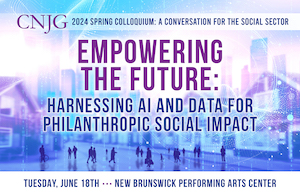
Date: Tuesday, June 18
Time: 9:30 a.m. to 3:30 p.m.
Location
New Brunswick Performing Arts Center
Arthur Laurents Theater
11 Livingston Ave, New Brunswick, NJ 08901
Directions and Parking
On Tuesday, June 18, 2024, the Council of New Jersey Grantmakers held the Spring Colloquium – A Conversation on the Social Sector at the New Brunswick Performing Arts center. This year, we explored the impact of AI and data on philanthropy and the nonprofit sector. Our panel discussion will brought together multiple perspectives to explore how AI can enhance problem-solving without losing human connections, how it affects equity, and how philanthropy has engaged with AI for funding initiatives.
The Technology Association of Grantmakers’ new Executive Director, Jean Westrick, moderated our esteemed panel that included Don Chen, President, Surdna Foundation; Rachel Kimber, Full Circle Solutions; and Dave Cole, State pf New Jersey’s Chief Innovation Officer.
After the panel, Jean Westrick, TAG, facilitated an afternoon session on an AI Framework for Philanthropy. Additionally, the Community Resource Exchange presented an afternoon session on an AI Guide for Nonprofits facilitated by their CEO, Tiloma Jayasinghe, CEO and Jared Carroll, Senior Consultant.
CNJG’s spring colloquium brought together New Jersey grantmakers and nonprofits to connect with each other, Increase their knowledge, learn best practices, find opportunities for collaboration, and to be introduced to new ideas.
Conference Photos

Deepening Philanthropic and Nonprofit Partnerships in New Jersey
Doing Good Better, a partnership of the Council for New Jersey Grantmakers and the New Jersey Center for Nonprofits, is a community of funders and nonprofits taking action against the power imbalances and racial inequities in philanthropy, nonprofits and government. Accessible, equitable, and mutually accountable relationships are primary and indisputable building blocks for a stronger society and thriving communities. Our goal is to shift the culture of the New Jersey philanthropic and nonprofit ecosystem by encouraging funders, nonprofits, and government to create shared power rooted in collaboration, mutual trust, and respect.
Doing Good Better Goals: A Framework for Change
The Doing Good Better Steering Committee encourages funders to focus on and advocate for four changes that can make an immediate difference in addressing power dynamics between nonprofits and funders and maximizing nonprofit impact.
Why now?
For many years, but particularly in the context of the COVID-19 pandemic, natural disasters, and the heightened outcry for racial equity and social justice, funders have been urged to embrace more flexibility and transparency in their grantmaking. Practices such as general operating support, simplified application and reporting procedures, multi-year funding and others have been shown to level the power imbalance, advance greater equity, strengthen partnerships between funders and their nonprofit partners, and thereby improve community impact.
Many grantmakers temporarily embraced flexible practices in the wake of Superstorm Sandy and during the height of the pandemic, and these structural changes empowered nonprofits to become more resilient and have a greater impact in their communities. But while some funders have retained the flexible practices, others have reinstated previous restrictions.
In New Jersey and across the country, there is a renewed urgency to NOT return to business as usual. It’s long past time.
Doing Good Better invites all of us to reflect on how power is distributed in our partnerships, learn from our peers, and make adjustments that position all community partners for transformative, equitable change in New Jersey.
How?
Guided and informed by 50+ advisors from New Jersey who represent a broad range of perspectives from nonprofits, philanthropy, and beyond, we are approaching this work through the lens of systems change – the recognition that transformative change can only occur after power structures have been addressed collectively. Specifically, Doing Good Better encourages funders to consider the power dynamics that underpin their policies, practices, and resource flows. To do this, we provide resources and a space for dialogue centered on changes in key practices and culture shifts.
Quick practice changes you can make now.
The road to systems change begins with changing practices that impede nonprofits’ pursuit of their missions, and implement practices that demonstrate respect for and trust in the expertise and experience of nonprofits and the communities they serve. Several key practices have consistently been shown to be particularly effective. Many of these have been requested by nonprofits for quite some time, and are reflected in the principles of Trust-Based Philanthropy and Community-Centric Fundraising, among others. Here are a few practice changes you can make now:
Type of Funding
● Give multiyear and unrestricted funding, especially for grantee partners with which you’ve had long term relationships.
Access to Funding
● Create alternative processes for organizations too small to submit audits to reduce barriers to obtaining grants.
● Set aside funding pools for BIPOC-led organizations that may not have access to traditional funding sources.
Simplifying the Process
● Simplify and streamline application and reporting processes.
● Eliminate annual requests for organizational information that does not change from year to year.
Learning
● Engage with the community through participatory grantmaking that aligns with the community’s goals.
● Open dialogues with nonprofits by soliciting and acting on feedback
How do we know?
We’ve asked the experts: nonprofits, foundations, and community members who are working directly in our community as well as peers from across the country who are eliminating power imbalances in their own communities.
● Feedback from over 50+ Advisors
● The Council of New Jersey Grantmakers survey
● The Center for New Jersey Nonprofit’s survey
● The Trust Based Philanthropy Project
● The Community-Centric Fundraising movement
● Thought leaders and advocates throughout the nonprofit community
● Case studies from across the US
We are pleased to share links to organizations and other resources that assist nonprofit with development, volunteer recruitment, and other key aspects of their work.
New Jersey Center for Nonprofits
The New Jersey Center for Nonprofits is the only umbrella organization for all New Jersey 501(c)(3)s. Since 1982, the Center has provided advocacy, resources, training and information to strengthen non-profits and help them thrive. The Center offers an active list of funding opportunities for NJ-based nonprofits. CNJG is partnering with the New Jersey Center for Nonprofits by sending any and all funding opportunities from our members and other funders to add to this page. Our goal is to make this page one of the first places New Jersey non-profits visit to find funding opportunities.
NJ Division of Consumer Affairs: Charities Registration Section
The CR & I Section administers and enforces the provisions of the Charitable Registration & Investigation Act (CRI Act) which regulates the fund raising activities of most charitable organizations and all professional fund raisers, fund raising counsels, commercial co-ventures and solicitors conducting business within the State of New Jersey.
Foundation Directory Online
The Foundation Center, now Candid.org, has launched Foundation Directory Online, a website you can use to search the basic profiles and IRS Forms 990-PF of nearly 90,000 grantmakers, giving them access to contact information, fields of interest, financial data, and program priorities. Registration is required. They offer a free version that gives basic information, or one can subscribe for a fee to access more detailed information.
Those seeking funds can also access a paid version of the Foundation Directory Online through Candid’s Funding Information Network access locations. There are several in New Jersey and in neighboring states.
Also from the Foundation Center, Foundation Funding for U.S. Democracy, a new nonpartisan resource that provides data about foundations and their democracy-related grantmaking in a structured, contextualized, and visual format. The project documents foundation support across several key areas: campaign and election processes, governing institutions and processes, information and media, and public engagement and voting.
Pro Bono Partnership
Pro Bono Partnership provides business and transactional legal services to nonprofit organizations serving the disadvantaged or enhancing the quality of life in neighborhoods in New York, New Jersey, and Connecticut.
Association of Fundraising Professionals, New Jersey Chapter
The Association of Fundraising Professionals fosters the professional development of fundraising professionals and promotes ethical standards in the fundraising profession. The New Jersey Chapter is an individual member association that advances philanthropy through education, training, and advocacy across the state, basing its programs and services on research, experience and the highest code of ethical principles and standards of professional practice.
Association of Fundraising Professionals, Southern Jersey Chapter
The Association of Fundraising Professionals NJ, Southern Chapter serves Atlantic, Burlington, Camden, Cape May, Cumberland, Gloucester, Ocean and Salem counties in the southern-most region of the state.
Grant Professionals Association
The Grant Professionals Association helps grant professionals seek to continually improve their professional knowledge and skills in grant research, proposal development, and post-award grant management. They provide a consultant directory to find assistance with preparing grant applications and proposals.
NJ Chapter of Grants Professional Association
The statewide chapter of the Grants Professional Association..
Resources
The Philanthropic Infrastructure landscape
The Council on Foundations put together this list of philanthropy-supporting organizations (PSOs) that engage philanthropy, share resources, increase trust in philanthropy, and improve our local communities.
Exploring the Social Sector Infrastructure
The Urban Institute created this microsite that details the infrastructure organizations that support the social sector.
Common Grant Application and Report Form
More than a decade ago, the Council of New Jersey Grantmakers and Philanthropy New York spearheaded a project to develop common application and report forms to help streamline the grant application process and ease the often time-consuming grant preparation process.
The Common Grant Application is a four-page form, which includes directions for use, a sample cover sheet, and the common grant proposal guidelines. The separate Common Report Form is accepted by many funders and helps to streamline the grant-app/report process. Please check with funders to see if they accept this documentation before sending.
If you know of other resources that you feel would be valuable to feature in this area, contact Theresa Jacks.
Capacity building enables nonprofit leaders and organizations to develop the skills and resources they need to improve their work. Since each situation is unique and circumstances are always changing, effective capacity-building support is tailored to best suit the needs of grantees. This publication offers practical guidance and considerations to help grantmakers design an impactful approach.

Get on the map and give smarter
Get on the Map is an exciting data-sharing initiative designed to dramatically improve the quality and availability of giving data for our region. Using this tool to put your grantmaking in context will provide valuable insights that can transform your giving.
Knowing how other foundations or corporations are funding in a certain geographic area or with a specific nonprofit can make everyone’s work more effective.
 Imagine real-time answers to questions like:
Imagine real-time answers to questions like:
- How are others serving at-risk youth?
- Are organizations in our region receiving enough capacity building support?
- Who else funds economic development in our rural communities?
Through a partnership with Candid (formerly the Foundation Center) and the United Philanthropy Forum, Get on the Map enables CNJG members to see the scope of their grantmaking, find natural funding partners, and gain deeper understanding of New Jersey’s philanthropic landscape.
Watch the short video below to learn how easy it is to Get on the Map!
It starts with sharing your giving data
Your data will power valuable resources for your organization and our region, including access to the CNJG Foundation Funding Map, a special interactive searchable mapping platform, engineered by Candid.
When you share your data, you control your story. No one knows your grantmaking better than you. Tell your story, your way is good for the sector because better information benefits everyone. Join the community of funders sharing their data to ensure the field is acting on the best possible information. Share Now!
Self-Paced Training for Funders on Using Candid
Candid has also launched a new, free self-paced course for funders: Funding Smarter: Using Candid Tools to Inform and Share Your Foundation’s Work. The course is meant to help funders use Candid’s mapping, data, and knowledge tools to better identify funding peers, potential grantee partners, identify funding connections and gaps, and learn from knowledge other funders have already shared. It also highlights the value of sharing data with Candid.
New Jersey Organizations and Resources
- American Red Cross – Chapters covering the State of New Jersey
- State of New Jersey Catholic Charities - Diocese of Camden - Diocese of Trenton
- Community Emergency Response Teams provides opportunity for citizen volunteers to be involved in emergency management activities.
- Community Food Bank of New Jersey
- Goodwill NY NJ
- Jersey Cares recruits and engages volunteers in efforts that address community-identified needs.
- NJ 2-1-1 helps people find solutions to personal needs by informing them of resources in their community.
- NJ Department of Human Services: Disasters & Emergencies - Help & Information
- Pass It Along, an affiliate of the Hands on Network, recruits and engages volunteers.
- The Salvation Army - New Jersey Division
- Volunteer Center of Bergen County, Inc.
- Volunteer Lawyer’s for Justice - Provides legal support to New Jersey residents.
- United Way of Greater Philadelphia and Southern New Jersey
Nationwide Organizations and Resources
- American Institute for Conservation—Collections Emergency Response Team (AIC-CERT)
Offers free emergency response assistance to cultural organizations with collections. AIC-CERT is supported and managed by the Foundation of the American Institute for Conservation (FAIC) and consists of a force of 107 “rapid responders” trained to assess damage and initiate salvage of cultural collections after a disaster has occurred. - American Red Cross - Disaster Recovery Guides
- BBB Wise Giving Alliance
The BBB Wise Giving Alliance helps donors make informed giving decisions and advances high standards of conduct among organizations that solicit contributions from the public. - Center for Disaster Philanthropy
The when, where, and how of informed disaster giving - Center for International Disaster Information (CIDI)
Provides individuals, groups, embassies and corporations with information and guidance in support of appropriate international disaster relief efforts. - CERF+ Artists’ Relief Exchange along with its partners in the National Coalition for Arts Preparedness and Emergency Response are committed to providing and connected people to emergency relief.
- FEMA
Information from the Federal Emergency Management Agency - FEMA Geo Portal
This portal provides geospatial data and analytics in support of emergency management - FEMA - National Disaster Recovery Framework
This guide provides a flexible structure that enables disaster recovery managers to operate in a unified and collaborative manner to provide effective recovery support to disaster-impacted jurisdictions. - Guide to Navigating FEMA and SBA Disaster Aid for Cultural Institutions
- The Tsunami Learning Project: Lessons for Grantmakers in Natural Disaster Response
This guide, published by Grantmakers Without Borders, offers new tools for grantmakers when responding to natural disasters. - IRS Disaster Relief Resources for Charities and Contributors
In the aftermath of a disaster or in other emergency hardship situations, individuals, employers and corporations often are interested in providing assistance to victims through a charitable organization. The IRS provides a number of resources to help those involved in providing disaster relief through charities. - Disaster Relief, Providing Assistance Through Charitable Organizations
IRS Publication 3833 describes how members of the public can use charitable organizations to provide assistance to victims of disasters or other emergency hardship situations. - Emergency Drying Procedures for Water Damaged Collections
A guide from the Library of Congress - Preparation & Response for Cultural Institutions
A guide from the National Trust for Historical Preservation. - Small Business Administration
Learn about and apply for SBA Disaster Loans for business of all sizes – private and nonprofit
Native Voices Rising is a joint research and re-granting project of Native Americans in Philanthropy and Common Counsel Foundation. This report focuses on the practices and challenges of community organizing and advocacy, focusing on the need for increased investment in and sustained support for American Indian, Alaska Native and Native Hawaiian communities.
Joint Statement from CNJG and the Center for Non-Profits
This statement also appeared on NJ Spotlight.
A conversation between two customers in line at a New Jersey supermarket turned ugly when one man denigrated the other with a racial slur and blamed the fellow shopper for the coronavirus pandemic.
With so much else going on these days, it would be so easy to react to such a seemingly minor incident by saying, oh well, these things happen. Times are tough; tempers are short.
But shrugging our shoulders is not an option. Doing so is complicity in a wrongful acts that too often are repeated, over and over. Our silence merely emboldens those who would tear apart the fabric of our society, whether through hate or ignorance – or the extremely volatile mix of the two.
It’s not difficult to connect the dots between “little” incidents and the systemic racism that leads to tragedies like the killing of George Floyd in Minneapolis. When we ignore or accept any examples of people being demeaned over what they look like or where they (or their ancestors) came from, we only open the door for massive abuses and the wrenching reckoning that follows them.
We mustn’t be cowed by fear of being seen as overly sensitive or labeled “politically correct.” This is about being morally and ethically correct in the face of bias and hatred – and that shouldn’t be too much to ask of Americans, regardless of their political party or ideology.
As state Attorney General Gurbir Grewal said recently, “COVID-19 is no excuse for racism, xenophobia, or hate. Discrimination and harassment in violation of New Jersey law remains illegal even if it occurs against the backdrop of a global pandemic." It’s gratifying to live in a state where the top law enforcement officer speaks out this way.
Unfortunately, it also is a state where reported hate crimes are up in recent years. We can’t tolerate such behavior, whether by police, elected officials or “average people.” There is too much at stake for bias to become the new normal.
As the leaders of the major philanthropic and non-profit membership organizations in New Jersey, representing both the wide range of non-profit groups and the multi-faceted funders of those groups, we feel compelled to speak out against the hateful responses we and our members have witnessed in reaction to the COVID-19 Pandemic.
Our country has seen countless examples of selfless sacrifice and good works over the past weeks, both on individual and institutional levels. We are proud that the members our organizations have been leaders in responding to the needs of our community.
But to our distress, some individuals are using the pandemic to put forward their bias and hatred toward their fellow citizens.
Times of crisis bring to the surface, on the part of some people, the need to scapegoat. Often, this takes the form of lashing out at particular groups, stirred up by inflamed rhetoric or more subtle code words or phrases, having no relationship to facts. In this time, there have been verbal and physical attacks against people of Asian and Pacific Islander background, as there were against Muslims after September 11 and against African-Americans and Latinos in countless other instances. This hatred and these attacks must stop.
The non-profit sector is the backbone of our communities, providing assistance and education to a wide range of people, in good times and especially in challenging times. Many of these services are a lifeline to people of all backgrounds, religions, ethnicities and statuses in life.
Non-profit organizations are the vehicle through which people can work together to selflessly assist others. People around the world view the United States as being unique in the breadth and depth of its charitable and philanthropic work, engaging the talents of all individuals, regardless of their economic or social status.
We call upon all people of good conscience in their good work to be alert for hateful words and actions and – always -- to speak out against them, both as individuals and as organizations.
Our language and our actions do matter.
Everyone, and especially people in positions of public trust or prominence, has the obligation to use our works and our lives to assist all in need and to honor the dignity and potential of all those we meet.
We call on not only our own members, but everyone who serves and volunteers in our sector to join us in this effort to speak out against racism and hatred and to exemplify all the best that we know our country is.
Maria Vizcarrondo
CNJG CEO and President
Linda Czipo
Center for Non-Profits CEO and President
William V. Engel
CNJG Board Chair
Gina M. Plotino
Center for Non-Profits Board Chair
Culture Workers often face inconsistent income and undervaluation of their work. Traditional budgeting models leave many without (or lack adequate support of) fair compensation using the belief that mission-motivation and passion for the work replaces the need for competitive salaries. The Solidarity Economy is an innovative and inclusive economic framework that prioritizes social justice, environmental sustainability, and community well-being. Join us for a compelling conversation about funding practices that use a solidarity-based approach and find out what New Jersey funders are learning about local compensation trends from the ArtsPay NJ report. Together we will explore ways to advocate and take action around worker pay equity and beyond.
Panelists:
John McEwen, Executive Director – New Jersey Theatre Alliance
Erica Nagel, Deputy Director – New Jersey Theatre Alliance
Eddie Torres, President & CEO – Grantmakers in the Arts
Moderator:
Diane Felcyn, Program Officer – New Jersey State Council on the Arts
Webinar Video
Resources
Solidarity Not Charity: Arts & Culture Grantmaking in the Solidarity Economy - Grantmakers in the Arts
Solidarity Economy Resources - Grantmakers in the Arts
Grants to Worker Cooperatives & Small Businesses — The Reader - Grantmakers in the Arts
Grantmakers’ Changes in Practice 2023 — The Reader - Grantmakers in the Arts
Support for Individual Artists’ Committee - Grantmakers in the Arts
ArtsPay NJ - New Jersey Theatre Alliance
ArtsPay NJ - Information, Reports, and Dashboard
ArtsPay NJ - Interactive Dashboard
ArtsPay NJ - Full Report
ArtsPay NJ - Summary Report
Webinars
Upcoming: Wednesday, October 23
Move the Money: Nuts & Bolts: Making Grants to Cooperatively Owned Small Businesses
Previous
Move the Money: Grantmakers in the Arts & Art.Coop Solidarity Economy Discussion Series
Move the Money Series: Guaranteed Income
Move the Money: The Richness of Southern Soils: Supporting Black Farming and Food
The Trust-Based Philanthropy Project is pleased to announce a six-part webinar series addressing common questions, clarifying misconceptions, and exploring ways to overcome obstacles in implementing trust-based philanthropy. CNJG is pleased to share this opportunity with our members.
Series Description: Trust-based philanthropy is a philosophy and approach rooted in values of relationship-building, mutual learning, and systemic equity – with a vision of advancing a healthier and more impactful nonprofit sector. While this approach is generally associated with six core grantmaking practices such as multi-year unrestricted funding and streamlined paperwork, the day-to-day work of trust-based philanthropy is very nuanced and dynamic. In fact, funders who have embraced this approach are finding that it requires ongoing self-reflection and rigor with regards to how they think about – and evolve – many of the deeply embedded practices and assumptions of traditional philanthropy.
Given these nuances, it is not surprising that there are many questions and occasional misperceptions about what it actually means to embody trust-based philanthropy in practice. In this 6-part webinar series, the Trust-Based Philanthropy Project will explore some of the most commonly asked questions and the underlying misperceptions that may be roadblocks to understanding and operationalizing trust-based philanthropy.
Each session in the series will focus on a frequently asked question from the field, and will feature perspectives from foundation leaders and others who have grappled with similar or related questions. At the end of each session, participants will walk away with: 1) a deeper and more nuanced understanding of the underlying cultural philosophy of trust-based philanthropy; 2) tips for how to think about and approach these nuances in their own work; and 3) talking points for how to answer these FAQs when they come up from colleagues or peers.
Each session will also provide dedicated space for small-group peer dialogue (among CNJG members) about ways to implement these practices into your grantmaking.
Cost: Free
Who should attend: Anyone in a grantmaking role that is curious about understanding the nuances of trust-based philanthropy and how it applies to your work. This series will be ideal for those who have some baseline familiarity with trust-based philanthropy and have questions about how it manifests in practice.
Please note: this webinar series is separate from CNJG’s 2023 Conference for the Social Sector, which features an in-person luncheon keynote by the Trust-Based Philanthropy Project. CNJG’s conference is open to both funders and nonprofits, so the keynote will differ from this series. Because CNJG’s Doing Good Better initiative leans on the principles of Trust-Based Philanthropy, we encourage our members to register for these sessions - as time allows - for funders to learn about different approaches to changing systems in New Jersey.
Demystifying Trust-Based Philanthropy Series Sessions
Session #1: Does Trust-Based Mean Unconditional Trust?
Session #2: Does Unrestricted Funding Automatically Make a Funder Trust-Based?
Session #3: How Do We Approach Risk and Due Diligence in Trust-Based Philanthropy?
Session #4: What Does Grantee Accountability Look Like in Trust-Based Funding?
Session #5: How Do You Measure Impact in Trust-Based Philanthropy?
Session #6: What Does Racial Equity Have To Do With Trust-Based Philanthropy?
Resources
Recording: Session 5: How Do You Measure Impact in Trust-Based Philanthropy?
Transcript: Session 5: How Do You Measure Impact in Trust-Based Philanthropy?
Presentation: Session 5: How Do You Measure Impact in Trust-Based Philanthropy?
Trust-Based Philanthropy Peer Exchange for Grantmakers
The 6 Practices of Trust-Based Philanthropy
Trust-Based Philanthropy in 4D Overview
Trust-Based Philanthropy Story Map
Trust-Based Framework for Learning and Evaluation
Headwaters Foundation Grant Reporting Process
AJWS Accompaniment Model
Satterberg Foundation's Insight Circles Report
Headwaters Foundation Learning Book
AJWS Social Movements Tool
Center for Effective Philanthropy Blog: Rigorous Evaluation Versus Trust-Based Learning: Is This a Valid Dichotomy?
The Trust-Based Philanthropy Project is pleased to announce a six-part webinar series addressing common questions, clarifying misconceptions, and exploring ways to overcome obstacles in implementing trust-based philanthropy. CNJG is pleased to share this opportunity with our members.
Series Description: Trust-based philanthropy is a philosophy and approach rooted in values of relationship-building, mutual learning, and systemic equity – with a vision of advancing a healthier and more impactful nonprofit sector. While this approach is generally associated with six core grantmaking practices such as multi-year unrestricted funding and streamlined paperwork, the day-to-day work of trust-based philanthropy is very nuanced and dynamic. In fact, funders who have embraced this approach are finding that it requires ongoing self-reflection and rigor with regards to how they think about – and evolve – many of the deeply embedded practices and assumptions of traditional philanthropy.
Given these nuances, it is not surprising that there are many questions and occasional misperceptions about what it actually means to embody trust-based philanthropy in practice. In this 6-part webinar series, the Trust-Based Philanthropy Project will explore some of the most commonly asked questions and the underlying misperceptions that may be roadblocks to understanding and operationalizing trust-based philanthropy.
Each session in the series will focus on a frequently asked question from the field, and will feature perspectives from foundation leaders and others who have grappled with similar or related questions. At the end of each session, participants will walk away with: 1) a deeper and more nuanced understanding of the underlying cultural philosophy of trust-based philanthropy; 2) tips for how to think about and approach these nuances in their own work; and 3) talking points for how to answer these FAQs when they come up from colleagues or peers.
Each session will also provide dedicated space for small-group peer dialogue (among CNJG members) about ways to implement these practices into your grantmaking.
Cost: Free
Who should attend: Anyone in a grantmaking role that is curious about understanding the nuances of trust-based philanthropy and how it applies to your work. This series will be ideal for those who have some baseline familiarity with trust-based philanthropy and have questions about how it manifests in practice.
Please note: this webinar series is separate from CNJG’s 2023 Conference for the Social Sector, which features an in-person luncheon keynote by the Trust-Based Philanthropy Project. CNJG’s conference is open to both funders and nonprofits, so the keynote will differ from this series. Because CNJG’s Doing Good Better initiative leans on the principles of Trust-Based Philanthropy, we encourage our members to register for these sessions - as time allows - for funders to learn about different approaches to changing systems in New Jersey.
Demystifying Trust-Based Philanthropy Series Sessions
Session #1: Does Trust-Based Mean Unconditional Trust?
Session #2: Does Unrestricted Funding Automatically Make a Funder Trust-Based?
Session #3: How Do We Approach Risk and Due Diligence in Trust-Based Philanthropy?
Session #4: What Does Grantee Accountability Look Like in Trust-Based Funding?
Session #5: How Do You Measure Impact in Trust-Based Philanthropy?
Session #6: What Does Racial Equity Have To Do With Trust-Based Philanthropy?
Resources
Recording: Session 4: What Does Grantee Accountability Look Like in Trust-based Philanthropy?
Transcript: Session 4: What Does Grantee Accountability Look Like in Trust-based Philanthropy?
Presentation: Session 4: What Does Grantee Accountability Look Like in Trust-based Philanthropy?
Trust-Based Philanthropy Peer Exchange for Grantmakers
The 6 Practices of Trust-Based Philanthropy
Trust-Based Philanthropy in 4D Overview
Charlize Theron Africa Outreach Project Welcome Packet
Center for Effective Philanthropy’s Grantee and Applicant Perception Report



